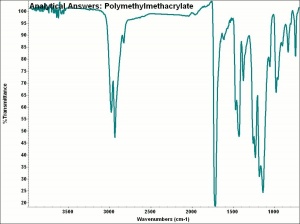Polymethyl methacrylate
Description
Hard, glasslike, thermoplastic resin with a softening temperature from 105-125 C. Polymethyl methacrylate was the first commercially sold in 1933 as glass substitutes, such as Plexiglas®, Perspex, and Lucite®. Polymethyl methacrylate has good optical properties and is often used as a replacement for glass. It is resistant to oxidation and photodegradation.
See also Acrylic resin.
Synonyms and Related Terms
PMMA; acrylic resin; polymethylmethacrylate; polimetilmetacrilato (Esp.); poli(metacrilato de metilo) (Esp.); polyméthylméthacrylate (Fr.); polimetilmetacrilato (It.); polimetilmetacrilato (Port.)
Examples: Lucite® [Lucite]; Perspex® [Lucite); Plexiglas® [Arkema]; Altuglas® [Arkema]; Acrylite® [Piedmont Plastics]
Physical and Chemical Properties
- Burns with a shiny flame and blue center; smells sweet and fruity.
- Soluble in esters, ketones, aromatic and chlorinated hydrocarbons. Insoluble in water, alcohols, petroleum hydrocarbons.
- Brinell hardness=18-20
| Composition | (C5O2H8)n |
|---|---|
| CAS | 9011-14-7 |
| Melting Point | 105-125 C(softens) |
| Density | 1.16-1.20 g/ml |
| Refractive Index | 1.482-1.521 |
Comparisons
General Characteristics of Polymers
Physical Properties for Selected Thermoplastic Resins
Resources and Citations
- Omnexus: Guide on PMMA
- R. J. Gettens, G.L. Stout, Painting Materials, A Short Encyclopaedia, Dover Publications, New York, 1966
- G.S.Brady, Materials Handbook, McGraw-Hill Book Co., New York, 1971
- Theodore J. Reinhart, 'Glossary of Terms', Engineered Plastics, ASM International, 1988
- Pam Hatchfield, Pollutants in the Museum Environment, Archetype Press, London, 2002
- Wikipedia: http://en.wikipedia.org/wiki/Plexiglas (Accessed Nov. 9, 2005)
